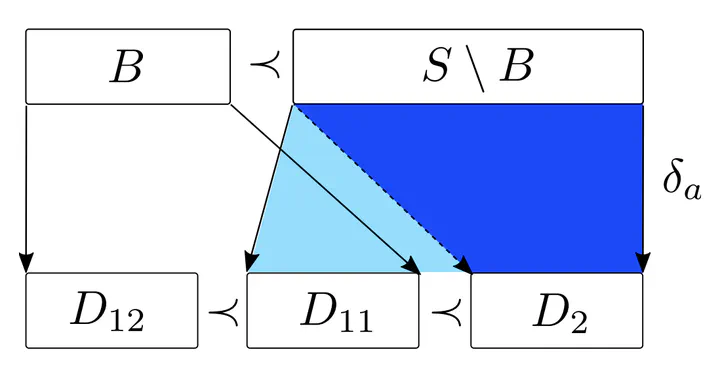Sorting Finite Automata via Partition Refinement
Sep 4, 2023·
 ,
,
,
,
,
·
0 min read
,
,
,
,
,
·
0 min read
Ruben Becker
Manuel Cáceres
Davide Cenzato
Sung-Hwan Kim
Bojana Kodric
Francisco Olivares
Nicola Prezza
 One of the cases of our (ordered) partition refinement algorithm
One of the cases of our (ordered) partition refinement algorithm
Abstract
Wheeler nondeterministic finite automata (WNFAs) were introduced in (Gagie et al., TCS 2017) as a powerful generalization of prefix sorting from strings to labeled graphs. WNFAs admit optimal solutions to classic hard problems on labeled graphs and languages such as compression and regular expression matching. The problem of deciding whether a given NFA is Wheeler is known to be NP-complete (Gibney and Thankachan, ESA 2019). Recently, however, Alanko et al.(Information and Computation 2021) showed how to side-step this complexity by switching to preorders: letting $Q$ be the set of states and $\delta$ the set of transitions, they provided a $O(|\delta|\cdot|Q|^2)$-time algorithm computing a totally-ordered partition (i.e.equivalence relation) of the WNFA’s states such that (1) equivalent states recognize the same regular language, and (2) the order of (the classes of) non-equivalent states is consistent with any Wheeler order, when one exists. As a result, the output is a preorder of the states as useful for pattern matching as standard Wheeler orders.
Further extensions of this line of work (Cotumaccio et al., SODA 2021 and DCC 2022) generalized these concepts to arbitrary NFAs by introducing co-lex partial preorders: in general, any NFA admits a partial preorder of its states reflecting the co-lexicographic order of their accepted strings; the smaller the width of such preorder is, the faster regular expression matching queries can be performed. To date, the fastest algorithm for computing the smallest-width partial preorder on NFAs runs in $O(|\delta|^2 + |Q|^{5/2})$ time (Cotumaccio, DCC 2022), while on DFAs the same task can be accomplished in $O(\min(|Q|^2\log|Q|, |\delta|\cdot |Q|))$ time (Kim et al., CPM 2023).
In this paper, we provide much more efficient solutions to the co-lex order computation problem. Our results are achieved by extending a classic algorithm for the relational coarsest partition refinement problem of Paige and Tarjan to work with ordered partitions. More specifically, we provide a $O(|\delta| \log |Q|)$-time algorithm computing a co-lex total preorder when the input is a Wheeler NFA, and an algorithm with the same time complexity computing the smallest-width co-lex partial order of any DFA. In addition, we present implementations of our algorithms and show that they are very efficient also in practice.
Type
Publication
In ESA 2023